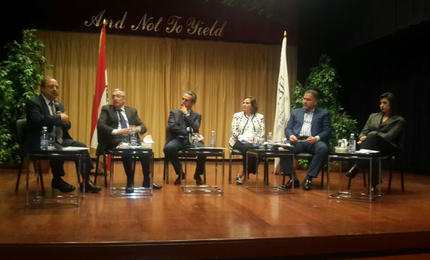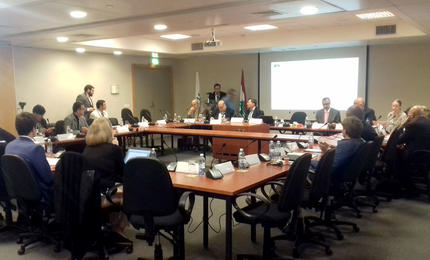Top experts discuss electoral law reform and peace building
LAU Byblos gathers politicians, practitioners and academics from the region and beyond to discuss and share best practices for electoral law reforms in post-conflict societies.

On its second day, the conference held a panel focused on Lebanon’s experience with election reform with MPs Ghassan Moukhaiber, Ahmad Fatfat, Ali Fayyad, Arda Ekmekji, dean of Haigazian’s school of Arts and Sciences and former member of the SCEC and Lebanese Forces reprsentative Charlotte Sarkis. The panel was moderated by LAU Associate Professor Bassel Salloukh.

Through the discussion organizers hope to better mobilize the international community’s support for democratization.
Political party leaders, legislators, researchers, professors and members of civil society and nongovernmental organizations from around the world are gathered at LAU Byblos to debate the importance of electoral law reforms in post-conflict societies.
The objective of the three-day conference is to discuss how these reforms impact the region’s deeply divided societies and how they may contribute in conflict mediation through lessons learned from the many attempts undertaken in the region and beyond to improve the representativeness of political power. Top experts from Nepal, Indonesia, Nigeria and El Salvador will also share the experience of their respective countries and regions.
“This conference is very timely,” says Marwan Rowayheb, chair of LAU’s Department of Social Sciences, who is hosting the event in collaboration with the German Institute of Global and Area Studies (GIGA) and the Arab Network for Democratic Elections (ANDE). “We believe that scholars and policy makers should join forces to try and get both the governments and the people of these states to enjoy stable and sustainable democratic systems…. And the main prerequisite for this is to hold free and fair elections.”
Nashat Mansour, dean of the university’s School of Arts and Sciences, agrees that electoral law reform is key to realizing progress at all levels. “In Lebanon, researchers will not have much difficulty in establishing that the existing system has proved to be impotent, as far as the economic and social progress is concerned, and has condoned unprecedented levels of corruption, disrupting the roles of the judiciary and law enforcement.” For Mansour, even those in power cannot deny that “no serious reform can take place in the existing system unless the electoral law is changed in a way that allows the suppressed segments of the population to be represented in the parliament.” However, he adds, this leads to serious challenges and raises major questions pertaining to the nature of the reforms adopted in divided societies that are often based on sectarianism.
Yemen, Lebanon, Syria and Iraq are only a few examples of such societies according to Makram Ouaiss, assistant professor of political science and international affairs at LAU, who went on to point out that the conflicts the MENA region has been witnessing are amongst the most violent in recent memory. “One thing we are sure of is that once the cannons have stopped, the difficult process of peace building will begin,” he says. While various countries of the world have experienced different models of electoral engineering in post-conflict situations some have been deemed successful and others criticized for their unfortunate consequences, he explains. Therefore, “We hope the conference will allow participants to exchange best practices and identify processes by which an electoral law reform can best be implemented in post conflict environments” taking the most recent international experiences as case studies and identifying new ways to tackle the challenges that might lie ahead.
Although the topic has been recurrently debated by regional and international experts in the field, Ziad Abdelsamad, executive director of the Arab NGO Network for Development and Coordinator at ANDE, believes that the conference is of utmost importance for the region. “Democratic elections are an essential factor in re-habilitating the rule of law and institutions and contribute to overcoming challenges resulting from political vacuum.” Another factor, according to the LAU instructor, lies in the renewal of the social contract. “We have to reorganize the citizen/state relationship… and rebuild the confidence of the citizens in their government.” The expert also stressed on the important role played by electoral management bodies and their experience in the field. Representatives of such organizations, like the Election Observation Democracy Support that supports EU election observation and the Lebanese Association for Democratic Elections were also among the conference’s participants.
Stephan Rosiny, research fellow at GIGA Institute for Middle East Studies has known the region, and Lebanon in particular, for several decades now. “We are very lucky to be meeting all together – politicians, academics and the practitioners – to engage in a dialogue that I hope will be fruitful.” Reflecting on the recent regional and global context, Rosiny asks: Did the ‘Arab Spring” advance the democratization process in the Middle East? Referring to the Brexit and the election of Donald Trump as U.S. president elect, the researcher wonders if the world is experiencing some kind of crisis of democracy. “But democracy is a process that we must preserve, defend and improve.”
The conference recommendations will be compiled in a report aimed at academics and practitioners who will be involved in electoral law design.
More
Latest Stories
- Into the Psychology of Justice
- Alumnus Zak Kassas on Navigation, Spoofing and the Future of GPS
- Hearing Between the Lines
- LAU Hematology Conference 2025: Advancing Science Through Interdisciplinary Exchange
- Dr. Chaouki T. Abdallah Invested as LAU’s 10th President
- LAU Guides Its Students Through the Code of Conduct
- Innovative Procedure at LAU Medical Center–Rizk Hospital Signals Hope for a Patient With a Congenital Disease
- LAU’s Inaugural PodChat Session Addresses AI Detection in the Classroom

